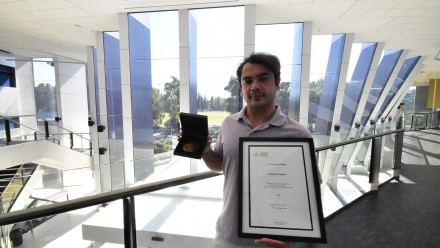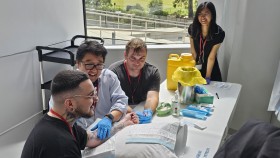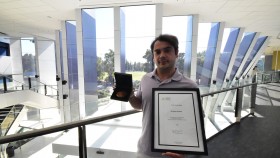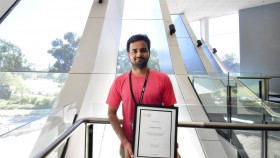All Staff Welcome to 2016
I want to begin my address by also acknowledging and celebrating the First Australians on whose traditional lands we meet and work, and whose cultures are among the oldest continuing cultures in human history. Let us pay our respects to the elders of the Ngunnawal people past and present.
I start here because this is where Australia's national university should start. We must play a leadership role in the reconciliation between Indigenous and non-Indigenous Australians. ANU should be the destination of choice for Aboriginal and Torres Strait Islander intellectual leaders as a place of education, of research and of policy.
I start here because it goes to the heart of what it is to be the national university and what it means to belong to the national university.
We, all of us together be we academic, professional or technical staff, are the national university. It is an intellectual community, a national institution and a university of international renown that I am immensely proud to be part of and incredibly honored to lead.
I certainly never imagined as a 18 year old Alaskan boy on my first visit to Canberra, playing the French horn on this very stage in this very hall, that I would one day be standing here as Vice-Chancellor of this great institution, inviting you, my colleagues, to join me as we write the next chapter of ANU history.
This place nurtured me. It gave me an opportunity to push the boundaries as a young researcher. It provided me with the environment to develop and grow through the stages of my career, to learn and be mentored by those who came before me.
My ambition as Vice-Chancellor is to pay that forward. To foster a culture where we can all reach our full potential. Where excellence is cultivated, expected, understood and celebrated. A culture that attracts the best and brings out the best.
A culture that provides opportunity equally to women and men, equally to Indigenous and non-Indigenous Australians, equally to people living with a disability, and equally to those who aspire to do great things regardless of sexuality, religion, ethnicity or socio-economic status.
A culture that promotes a happy workplace and a safe place to study. A culture defined by trust and respect.
A culture where we are all proud to be part of the national university.
My vision for this community is one that is defined by trust and respect. A community that is open, accountable, where we engage with each other and with the community outside of the campus.
Seventy years ago, on 1 August 1946, the Bill establishing The Australian National University was passed by Federal Parliament and marked, in part, the beginning of modern Australia. We were founded to develop Australia's intellectual leaders and give this country the research that would, in the language of that time, ensure Australia took its place amongst the civilized nations of the world.
ANU has been integral to the building of Australia as a prosperous country with a unique national identity. Our alumni populate the universities of this nation, the corridors of parliament and our governments, the boardrooms and engine rooms of industry, and the frontlines of civil society.
Our staff and alumni have created a modern Australia. To take just one example, ANU alumna Susan Ryan, Australia's current Aging and Disability Discrimination Commissioner, changed the country forever as Cabinet Minister when she introduced the Sex Discrimination Act in 1984 and the Affirmative Action Act in 1986.
In the past decade, we have produced two Australians of the Year: Aboriginal leader and champion of reconciliation, Professor Mick Dodson in 2009 and current Australian of the Year and ANU alumnus General David Morrison. Both will be on stage to welcome our newest additions to the ANU community at the Commencement Address for our incoming students next week. Come out next Thursday a we begin a tradition where we, the staff, welcome the next generation into our community, a welcome like the one you have given me today.
We have much to be proud of as we write the next chapter. But we are at a cross-roads. We could be a very good regional Australian university. Or, we can now re-assert ourselves as the national university and one that stands alongside the very best universities in the world.
The challenges confronting Australia today are far removed from those in the aftermath of global war 70 years ago. Just as ANU played a critical role in the postwar development of Australia, the national university has a critical role in shaping contemporary Australia.
Contemporary Australia needs a highly educated population whose intellectual leaders shape national, regional and global ideas to ensure for future generations a world that is healthy, sustainable and peaceful.
As your Vice-Chancellor it is my ambition that we shape modern Australia by producing and nurturing intellectual leaders of national, regional and global standing. We shape modern Australia through excellence in research, in education and in societal transformation.
Nurturing global intellectual leaders like multi-award winning immunologist Professor Carola Vinuesa, who has led the discovery of genes that are important for immune regulation, paving the way for new drugs to be developed to fight autoimmune diseases such as lupus, juvenile diabetes and certain cancers.
We will undertake research of distinctive strategic value for the nation. We bring our unique combination of discipline strength across arts and humanities, social sciences, engineering, medicine and science, interdisciplinary inquiry and innovative application to the challenges facing contemporary Australia.
We contribute to the policy building blocks of our nation in the areas of diplomacy, law, economics, and defence; to the understanding of languages and culture of our own peoples and the peoples of our Asia-Pacific region.
The Australian Government and the Australian people through the National Institutes Grant endow us with a responsibility to ensure our research is internationally excellent and nationally important.
We can each meet this obligation. We must not shy away from ambition. Our research will be second-to-none in Australia. But it must be more than that. We should aim to have each of our areas of research sit beside the best departments in the world, and without exception be in the top 100 departments in the world
Our focus should be on quality not quantity. We should invest in young people for whom we have to compete against the best universities in the world. We must have the patience and the confidence to invest in people and ideas we know are right.
Investing in people like distinguished Professor Chennupati Jagadish, who last week was awarded Australia's highest honour for his service to physics and engineering. Jagadish, in his own words, arrived at ANU from India 25 years ago with a 2-month old baby and a two-year contract. His research has led the world in nanotechnology, and he has influenced the lives and academic careers of hundreds of students and researchers. He not only leads research that is second-to-none, but as a mentor, a philanthropist and a just a great person, he is one the most beloved and respected members of our community.
As your Vice-Chancellor it is my ambition to offer an education unique in Australia and amongst the best in the world.
Our diverse student body will receive an education distinguished in its excellence, with a very low student to staff ratio, high research intensity, and an integrated on-campus experience.
Our students will be drawn from across Australian society and all nations of the world.
Students like Steph Pollard, who gave the welcome to country this morning. Steph is the embodiment the quality of students we seek. The first in her family to attend university, she has combined her studies here at ANU with a promising career on the athletics track. As a Science student and as a representative at the Australian University Games, Steph has shown that excellence in the pursuit of both her career and dreams can be achieved.
I've known Steph since she was 9-years-old - my own boys and her ran together in Little Athletics at Queanbeyan. I know how much hard work and determination she has put in and I am proud of what ANU has offered her, and what she has offered back. I want more young leaders like Steph to have the opportunity to join this community.
As your Vice-Chancellor it is my ambition for our students to have an education program defined by excellence; excellence in student cohort, excellence in teaching, excellence in student experience, and excellence in outcomes.
Our ambition is for every mum and dad in this country to want their children to come to ANU.
My commitment is to work with you to deliver the most interesting student cohort this nation has ever seen - but I will need your help. It means getting out and telling prospective students why they can and should come to ANU. It means making the experience of our students here different to anywhere else. It means showing in everything you do that ANU is extraordinary.
Our graduates will be intellectual leaders. They will have excellent employment outcomes and make a difference in the world. We will measure the success of our education program not only on graduate employment and income, but on the breadth and quality of the institutions where our alumni work, the contributions they make to their institutions and their satisfaction with their ANU experience.
As your Vice-Chancellor it is my ambition that ANU transforms our society.
In a contemporary mission built upon our history, ANU will serve Australia and our region as the Asia-Pacific leader in policy research, design and analysis. We will provide outstanding education and training for policy leaders of our nation and our region.
We will identify emerging areas of need for the nation and provide research and education that will equip Australia to cope with challenges not yet imagined.
We will play a national role bringing together the best thinkers in academia, government, business and community sectors to foster capacity for nimble responses to a rapidly changing world.
As your Vice-Chancellor it is my ambition that we will be the national leader in breaking down the walls between universities, government, industry and civil society.
We can build on the legacy of people like Professor Bruce Chapman. Bruce's ground-breaking work for the Hawke Government on an income contingent loan scheme for higher education changed our education system forever. Since 1989 his system has ensured that millions of Australians could go to university regardless of the wealth of their parents while simultaneously providing our Universities with the income stream they need to be great. The result is that the Australian University system has emerged as one of the strongest in the world. Bruce has had a career between academia and government, and continues to be one of the most influential figures in higher education policy today.
ANU will ensure that its people can move between university, business and government, providing linkages and experiences that reduce the barriers to working together. We will improve collaboration between business and universities - not just because the government say this is important - but because it is interesting!
Interesting like the work based on some of the most fundamental physics that we do - that has lead to the development of quantum cyber-security technology and the establishment of the successful ANU spinoff Quintessence Labs. The company was named last year as one of the top emerging innovation companies by the global Security Innovation Network (SINET), and is working closely with the banking and government sectors to help safeguard organisations from cyber attacks.
The Australian National University is also central to the life of the national capital.
As your Vice-Chancellor it is my ambition that we will nurture an intellectual and cultural environment in Canberra worthy of a great nation's capital city. We will bring national, regional and global intellectual leaders to Canberra, fostering public discussion and debate across the breadth of our research.
Our artists and musicians will be of international standing and form the cultural foundation of our national capital. We are partners with our national cultural institutions in reflecting, understanding and shaping our national identity.
Reflecting upon and shaping our understanding of our national identity like Professor Joan Beaumont has long done through her work as historian, challenging the accepted version of our war history, and encouraging us to look beyond myths.
We are all here to work together for collective good - we should work together to educate our students, to do research that is cross-disciplinary, and to look at how we interact with the outside world.
I can promise you many more initiatives and incentives to get the different parts of the University to work together, and to engage with the world outside of the campus. Over the coming months, I'll be working my way around the campus, talking to you and seeking your contribution to building a contemporary national university.
Our motto, First, to learn the nature of things, has guided us in the first 70 years, and we can build on it in the next 70 years.
First, to learn the nature of things
Second, to teach what we have learned.
And, Third, to use what we have learned for the greater benefit of all.
Thank you
Brian.















